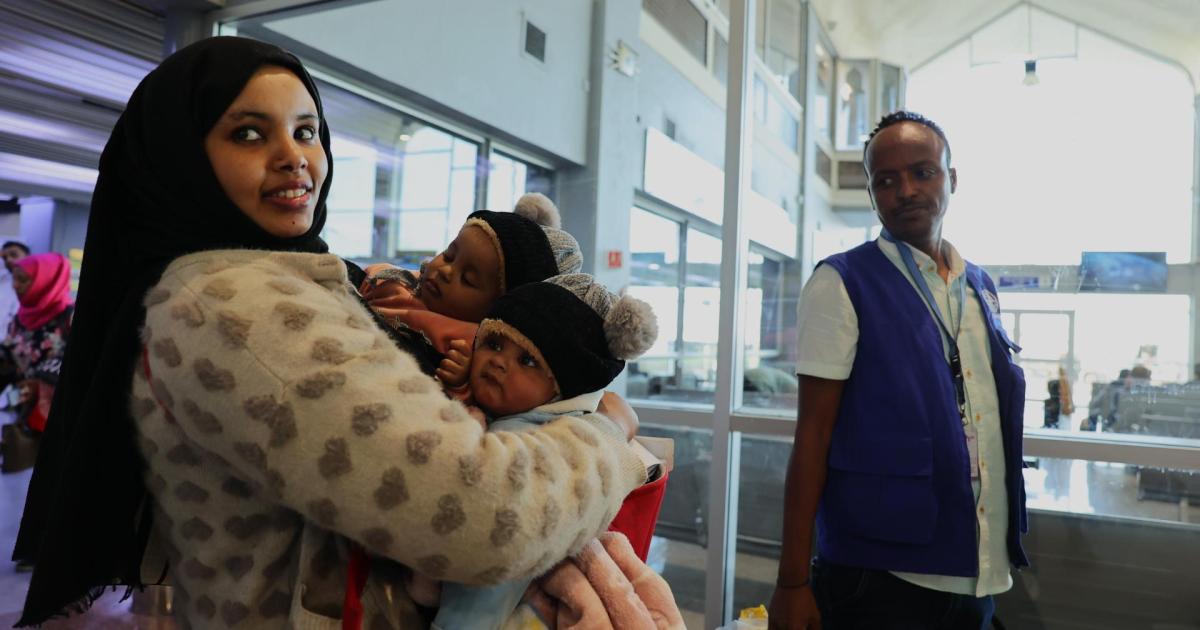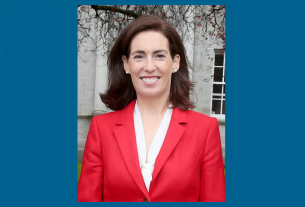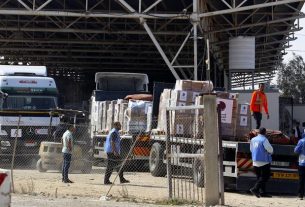Sana’a/Addis Ababa – On Monday (11/12), the International Organization for Migration (IOM) resumed its voluntary humanitarian return (VHR) flights from Yemen to Ethiopia, the first movement since September. The charter flight carrying 118 migrants, including men, women and children, brings a glimmer of hope to thousands of stranded Ethiopian migrants facing dire circumstances.
Insecurity and the lack of essentials like food, shelter and healthcare, along with exploitative labor conditions and violence perpetuated by groups involved in smuggling and trafficking, make life in Yemen challenging and extremely dangerous.
“Amidst these challenges, the international community is urged to swiftly intervene to ensure the safety and well-being of vulnerable migrants,” said Matt Huber, Acting Chief of Mission of IOM Yemen. “This marks just the beginning of this joint endeavour, and in light of the demand, we anticipate further collaboration to address the pressing needs of stranded migrants despite the limited resources for VHR in both Yemen and Ethiopia.”
Nearly 95,000 migrants arrived in Yemen between January and November this year, surpassing the total arrivals recorded in 2022, which stood at approximately 70,000. IOM estimates that over 200,000 migrants, primarily from East and the Horn of Africa, urgently require humanitarian assistance in Yemen.
These urgent needs often exceed the capacities of humanitarian actors to provide timely responses, hampered by limited access in certain areas and resource constraints faced by partner organizations.
Three years ago, 29-year-old Hayat embarked on a grueling journey from Ethiopia to Yemen, looking for better job opportunities. “Six months ago, I moved to Sana’a with my babies to seek help,” Hayat explains. “Since then, I have been waiting to finally reunite with my family.”
VHR flights are considered a lifeline for stranded migrants in Yemen. The programme establishes an efficient system for dignified returns to Ethiopia, ensuring essential access, logistics, and safety measures. Without VHR, thousands of stranded migrants are left without a safe route home, exposed to increased risks of violence, coercion and abuse.
In Yemen, IOM provides protection services through its Migrant Response Points and strategically located mobile protection teams, where migrants can seek counseling and guidance on accessing services. Additionally, IOM offers emergency health assistance and material support, including food, clothing, shoes and hygiene kits, to meet the basic needs of migrants.
Prior to the interruption of the VHR programme, more than 6,000 Ethiopian migrants had safely returned home from Yemen this year through flights originating from Ma’rib, Sana’a and Aden. Upon returning to Ethiopia, they receive comprehensive post-arrival assistance, encompassing onward transportation, medical assistance, mental health and psychosocial support, family tracing and reunification of unaccompanied migrant children in line with best interest procedures, and tailored reintegration support.
IOM’s humanitarian assistance and protection services are aligned with the Regional Migrant Response Plan (MRP) for the Horn of Africa to Yemen and Southern Africa. The MRP aims to address the needs of migrants in vulnerable situations and host communities in countries situated along the Eastern Migration Route, located between the Horn of Africa and Yemen and Southern route between the Horn and Southern Africa.
To reduce the risks of irregular migration, IOM urges states to focus on regional approaches to improve migration governance to render assistance to people regardless of their migration status, and to provide regular migration pathways to ensure safe migration for all.
IOM remains committed to assisting all migrants in need as additional flights are underway, extending essential support through its VHR programme funded by the United States Bureau of Population, Refugees and Migration, the German Federal Foreign Office, and the Governments of Norway and France.
***
For more information, please contact:
In Aden, Monica Chiriac, Email: [email protected]
In Addis Ababa, Kaye Viray, Email: [email protected]
In Cairo, Mohammedali Abunajela, Email: [email protected]
In Nairobi, Yvonne Ndege, Email: [email protected]



